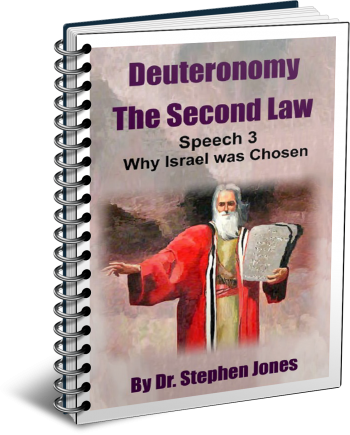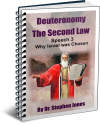Latest Posts
View the latest posts in an easy-to-read list format, with filtering options.

A commentary on the third speech of Moses in Deuteronomy 9-13. The book of Deuteronomy is a series of 12 speeches that Moses gave just before his death at the end of Israel's wilderness journey.
Category - Bible Commentaries

Deuteronomy 10:14 says,
14 Behold, to the Lord your God belong heaven and the highest heavens, the earth and all that is in it.
This verse ought to be the main footnote of Genesis 1:1, which establishes God as the Creator. To create something is to own it, to be interested in its welfare, and to be responsible for it. The fact that God is the Creator means that He owns all that He created.
Most believers would agree with this even without understanding the implications of ownership. In the divine law, ownership carries responsibility. If a man lights a fire that becomes a wild fire, the one who lit the fire is responsible for any damage that it does (Exodus 22:6). Why? Because he who lights a fire is its owner.
Likewise, if an ox gores someone, the owner of the ox has to pay for the damages (Exodus 21:32). If a man digs a pit—or even uncovers it—and an animal falls into it, the one who dug the pit must pay for the damages, because he is considered its owner.
This is how God thinks. This is God's standard of justice. Hence, when God created the heavens and the earth, He is ultimately responsible to pay for the damages which His creation causes. For this reason, when Adam and Eve sinned, God was responsible to deal with the problem. God brought judgment and condemned the sinners to death, holding them accountable for their sin. Yet God also had to take responsibility for the actions of mankind. This is proven by the fact that He came to earth in human form in the Person of Jesus Christ to pay the penalty for the sin of the world (1 John 2:2).
We see two levels of liability at work in this. First, God, as Creator and Owner of the Universe, was ultimately liable according to the law. Second, as Owner, God had the right to bring judgment upon that which He owns. One cannot use God's ownership and His restitution payment as proof that mankind will escape judgment. Man is certainly held accountable, for every man will be judged according to his works (Rev. 20:12).
The proper balance is in seeing that God has both rights and responsibilities as the Creator. He has the right to be obeyed, and He has the responsibility to subject all things under His feet. Under the Old Covenant, man took upon himself a vow of obedience (Exodus 19:8) to try to make himself obedient by self-discipline. This method failed (as God intended), so a New Covenant was instituted in which God took this responsibility upon Himself (Hebrews 8:10) by the power of the Holy Spirit operating within the hearts of men.
This entire question relates to the dispute over free will and the sovereignty of God. For further study of that issue, see my book, Free Will vs. Ownership.
Moses continues in Deuteronomy 10:15 and 16,
15 Yet on your fathers did the Lord set His affection to love them, and He chose their descendants after them, even you above all peoples, as it is this day. 16 Circumcise then your heart, and stiffen your neck no more.
So first Moses establishes God's power, rights, and responsibilities as the Creator of heaven and earth. Then he brings in the “love factor.” A God who is merely just and powerful might also be a tyrant. Indeed, many religions portray Him as such, and they teach men to fear Him, rather than to love Him.
A healthy “fear” is reverence and respect, as the Hebrew word ought to be understood. But many have an unhealthy fear, causing a breach in their relationship with God (as with Adam in Gen. 3:10). Fear causes men to remain at a distance and to know God only as a King that is too high for men to access—or as an impersonal Judge who dispenses justice but disdains any personal friendships with mankind.
But Scripture sets forth the path for men to become the sons of God (John 1:12). This is available not only to certain holy saints and prophets of the past, but to all men. See my booklet, The Sons of God.
It is the love of God that seeks a way to save His creation from destruction. It is His wisdom that finds the way to save His creation without violating the justice of His character. It is His sovereignty that gives Him the power to fulfill His wise and loving desire. This is discussed in my book, The Restoration of All Things.
In the wisdom of God, He chose one man, Abraham, and began to work through him to save the rest of mankind. While this was a great honor, the salvation plan was never meant to be for Abraham and his descendants alone. Rather, they were the agents by which God would bless all nations (Genesis 12:3).
It is the same with all of God's callings, including the five-fold ministry of Eph. 4:11. Being called and chosen in any of those ministries is “for the equipping of the saints for the work of service” (4:12). Being so chosen is not for the purpose of enjoying servants, but to have the honor of serving others in an official capacity.
So Moses tells Israel that God has chosen the descendants of Abraham, even setting them “above all peoples,” even as a supervisor or governor is given authority over others. Authority, however, has its responsibilities. Even as God's authority (actually, sovereignty) comes with the responsibility to bless, save, and reconcile all of creation, so also did Israel's authority come with responsibilities to be a blessing to all families of the earth.
In order to fulfill those responsibilities, Israel was admonished to look to the New Covenant. The circumcision of one's heart is a sign of the New Covenant (Rom. 2:29). Thus, Moses foresaw the New Covenant, though he did not fully explain it. Jeremiah later prophesied that a New Covenant was necessary (Jer. 31:31-34), once it was clear that the Old Covenant had failed to fulfill the purpose of God.
Moses continues by reminding Israel of the impartial justice of God.
17 For the Lord your God is the God of gods and the Lord of lords, the great, the mighty, and the awesome God who does not show partiality, nor take a bribe. 18 He executes justice for the orphan and the widow, and shows His love for the alien by giving him food and clothing. 19 So show your love for the alien, for you were aliens in the land of Egypt.
Though God had chosen Israel, He remained impartial in judgment. Israel was to use its position of authority to administer the law to the whole world impartially. It was NEVER the case that the law applied to Israel only, as so many have taught. Even in America, the law does not apply only to judges or government officials. They are chosen (“elected”) to apply the law impartially and wisely to all men. So it is with the divine law, as long as Israel uses it to bless all families of the earth by its impartial application with equal justice for all.
Hence, Israel was to love the aliens (foreigners) and not mistreat them. They were to remember how it felt to be mistreated when they were aliens in the land of Egypt. It is obvious that one of God's purposes in bringing Israel into Egypt was to show them how it felt to be mistreated. This ought to have been a lesson about how NOT to treat non-Israelites. God's impartial justice toward foreigners is clearly established, so Israel could follow God’s example.
So first, in verse 14, Moses establishes God's creative power with its rights and responsibilities. Then he sets forth the love and wisdom of God in verse 15. Then he sets forth the impartial justice of God in His dealings with all the nations that He has created.
The implications of these three aspects of God's character are enormous, and when we understand them properly, we are able to “fear the Lord your God, to walk in all His ways and love Him, and to serve the Lord your God with all your heart and with all your soul” (verse 12).